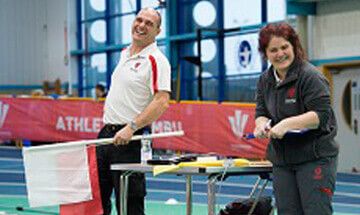
Colin Jackson
Colin Jackson
The year 2000 marked the end of the championship career of our greatest ever track and field exponent Colin Jackson. Although an Olympic gold medal remained an unattainable goal for the double world champion and record holder.
In Sydney Colin was making his fourth attempt at the ultimate prize, having taken silver in Seoul in 1988, seventh in Barcelona four years later when suffering with a rib injury and being one spot outside the medals in Atlanta in 1996.
When he was in his teens, he started training with Welsh national coach Malcolm Arnold and was a promising decathlete and long jumper before concentrating on the high hurdles. It was 20 June 1981 that the name of Colin Jackson first appeared in the world of athletics. At the then new Morfa Stadium in Swansea, he won the Welsh under 15 80m hurdles and a week later at Brecon he won the Welsh Schools’ title as well as adding the javelin (!) title. While a pupil at Cardiff’s Llanedeyrn High School he was a gifted all rounder, holding school records for javelin, long jump and high jump, while also excelling at cricket. His first representative honour was in 1982 when he ran in the school’s international match at Colwyn Bay.
Colin won his first medal in 1985 when he took the silver medal as an 18 year-old, at the European junior championships. Another silver followed a year later at the Commonwealth Games in Edinburgh. A hamstring injury forced him to miss the European championships that year but he made up for it by going on to win the World junior championships in Athens, breaking the European junior record. In 1987, he took the bronze at the World Championships in Rome and the silver in the European indoors. A year later he won what was to turn out his only Olympic medal with silver in Seoul.
An Olympic silver medal, a European and Commonwealth record in Sestriere and a Welsh record (200 21.29) running for Wales in Tel Aviv - 1988 certainly was the year in which Colin broadened both his horizons and his achievements. In the space of twelve months he had changed from being a young pretender into an established star on the world athletics stage.
In 1989 he was the World indoor silver medallist and also took his first European Cup win and in 1990, he won both the Commonwealth Games and European titles. At the Welsh Games in Wrexham Ron Jones’ long standing Welsh 100 record was finally broken as Colin ran 10.29. For his services to the sport he was awarded the MBE. In 1992 he finished seventh in the Olympics in Barcelona, having clocked the fastest time of four rounds with 13.10.
His Olympic disappointment was soon put on the back burner as in the 1993 World Championships in Stuttgart he shocked the world with an almost perfect run to win the gold with a world record of 12.91. He was voted “1993 Athlete of the Year” by the IAAF and recognised for his brilliant performance by the British Athletic Writers’ Association, who bestowed the same award. He was also awarded “Welsh Sports Personality of the Year” as he was in 1999.
Colin produced his best display of consistent sprint hurdling when he ran eleven races in under 13.10 in 1994. Indoors he also lowered the world record with a run of 7.30 in Sindelfingen, Germany. At the European indoors he created a unique double as he won both the 60 hurdles and 60 flat. Such was his improved sprinting speed that he came within 1/100th of Linford Christie’s European 60 record with a time of 6.49.
He finished fourth in the Olympics in Atlanta 1996, but suffered from more knee trouble afterwards. In 1998 the season he won his third successive European title in Budapest to become the first to do so in the event.
In 1999 he drew on all his experience to win the World championship in Seville - six years after his last World title. He became the first ever athlete to regain a world title. Early in 2000 he took his first gold medal after three silvers, by winning the World indoor championship.
Being ranked in the world’s top ten in his event every year since 1986, and in the top three since 1987, lapsing only in 1995 is an incredible span for any sportsman, let alone an athlete. He was top ranked each year from 1992 to 1994. His long career has brought him undoubted wealth – twenty-two major championship medals, twelve of them gold (one more than Linford Christie).
Colin is the only hurdler in the world to run under 13 seconds three times in a season and as well as both the indoor and outdoor world record holder, he has also held the world best in 1991 (22.63) for the rarely run 200 hurdles. As one of the greatest athletes in the history of world athletics, Colin’s record-breaking achievements go much deeper than his ultimate world records. After a European junior record of 13.44 in 1986 he has set seven European, eight Commonwealth and nine British records at 110 hurdles from 1988-1993; nine British and four Commonwealth and European at 60 hurdles indoors; fifteen Welsh records (100, 200, 110 hurdles and 60 hurdles) from 1985 to 1993. His appearance in Sydney took his total of British international vests to 62, by far the greatest by any Welsh athlete. He is the only Welsh athlete to compete in four Olympic Games.
Consistency is one attribute, which all athletes aim for, and this is one factor, which made Colin Jackson stand out from the rest of the high hurdlers of the world. He compiled the greatest ever season of sprint hurdling in 1993 with 13 races sub-13.20 and did even better in 1994 with eleven marks inside 13.10 as against five in 1993. Another record, which he is proud of, is the winning streak of forty-four hurdles races which only ended in February 1995 when beaten by Allen Johnson indoors in the same time of 7.42.
Mike Walters
Dolenni diddorol
Tudalennau yn yr adran hon a allai fod o ddiddordeb.


